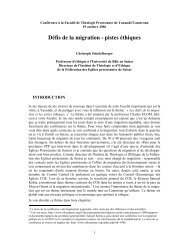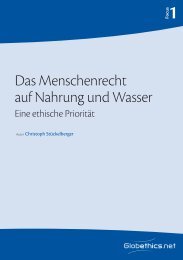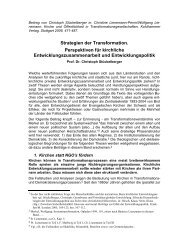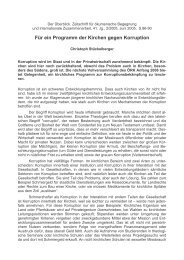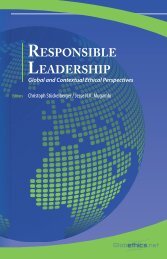BREAK THE CHAINS OF OPPRESION AND THE YOKE OF ...
BREAK THE CHAINS OF OPPRESION AND THE YOKE OF ...
BREAK THE CHAINS OF OPPRESION AND THE YOKE OF ...
You also want an ePaper? Increase the reach of your titles
YUMPU automatically turns print PDFs into web optimized ePapers that Google loves.
At the bottom of these enormous enterprises there was often the strong conviction<br />
that mission and civilisation were two sides of the same coin. In that case mission<br />
was an ally of the project of Enlightenment: the modernisation of the world. 4<br />
The Kingdom of God<br />
The alliance of the missionary movement and civilization became more and<br />
more problematic at the end of the colonial period and after the 1st and the 2nd World War. Civilisation had become a difficult concept, because of the deep crisis<br />
in Western Europe, a crisis that had affected humanity and civilisation in such<br />
a profound an horrible way.<br />
Concepts of ’civilization’ were no longer of use in describing the aim of the calling<br />
of the church. The renewal of Reformed theology that took place in Europe led to<br />
a new approach. Karl Barth’s theology challenged the projects of modern mankind<br />
in replacing them by the revelation of Jesus Christ as the decisive breaking point in<br />
history. This Christological view at history and eschatology (!) was the inspiration<br />
for the so called ‘theology of the Kingdom of God’. This theology was profoundly<br />
elaborated by Oscar Cullmann in his book ‘Christ and Time’ (Christus und die<br />
Zeit: die urchristliche Zeit- und Geschichtsauffas sung, Zürich, 1946). No longer was<br />
civilization seen as the goal of mission, but the proclamation of the Reign of God.<br />
This theology became so important in the field of mission, because it offered a new<br />
and practical translation for proclaiming the Gospel. Mission was no longer a spiritual<br />
matter but it could easily be connected with all kinds of practical work in the<br />
field of agriculture, health, etc. The theology of the Kingdom of God has among<br />
others led to the missiological concept of the comprehensive approach. Preaching<br />
of the Gospel and �activities � in the �field of development � �were<br />
seen as a inseparably<br />
connected. These projects of development could be seen as ‘signs of the coming<br />
Kingdom’, signs of the new era that had started with the coming, the death and the<br />
resurrection of Jesus Christ. His Kingdom becomes visible in concrete action. The<br />
reign of Christ is not an isolated event, it has universal dimensions.<br />
Oikumene and universality<br />
HopE<br />
This paradigm became the leading vision also within the ecumenical movement.<br />
Shortly after World War II the shift was made within the ecumenical movement<br />
from unity of the churches as the aim of the ecumenical work, towards the unity<br />
of the world. 5<br />
4 David J. Bosch, Transforming Mission, New York, 1991, 344.<br />
5 In fact there is a long tradition within the history of the church in which the universal<br />
character of the Gospel is connected with a universal view on actual historical developments.<br />
Already the 3rd Ecumenical Council in Ephesus (431) stated that the reign of<br />
�����������������������������������������<br />
� � � � � � � ���������������<br />
�<br />
– <strong>THE</strong>OLOGY <strong>OF</strong> HOPE IN TIMES <strong>OF</strong> GLOBALIZATION – 59



